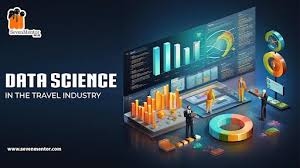We hear much about data science when it comes to tech firms, big data, or artificial intelligence. However, what people fail to appreciate is that data science does not exist only in labs or business suits—it works surreptitiously behind the scenes to drive much of what we do on a daily basis. From the time we wake up until we sleep, data science is operating in the background, shaping experiences, refining services, and making decisions.
Let's delve into how data science features in the mundane moments of daily life.
1. Morning Commute
Your daily morning routine probably includes checking the forecast, opening a navigation app, or listening to a carefully crafted playlist. All these are made possible by data science.
Weather forecasting employs predictive models using historical climate data, satellite readings, and atmospheric conditions.
Navigation applications such as Google Maps or Waze examine traffic flow in real time to recommend the fastest route. They employ machine learning algorithms to predict congestion and provide alternatives.
Music and podcast services such as Spotify or Apple Podcasts offer recommendations based on collaborative filtering and natural language processing to recognize your tastes.
2. Shopping and Recommendations
Online or offline, shopping is better with data science.
E-commerce websites use recommendation engines that analyze your past purchases, browsing history, and even what similar users bought to suggest products you’re likely to want.
Dynamic pricing algorithms adjust prices based on demand, time of day, and competitor pricing. That’s why flight or hotel prices change so frequently.
Retail stores use inventory optimization models to ensure popular items are stocked and promotions are timed for maximum impact.
3. Social Media and Entertainment
If you're using Facebook, Instagram, YouTube, or Netflix, you're using data science every day.
Social media sites examine your activity to tailor your feed to your interests. They display posts and ads that have been optimized to appeal to you.
Video streaming platforms analyze your viewing history and ratings to suggest new content. They examine viewer behavior to determine what shows to promote or produce.
Even TikTok's algorithm decides which videos to play next in response to your viewing habits, watch time, and interests.
4. Health and Wellness
Data science is revolutionizing the way we track and enhance our well-being.
Fitness apps monitor your steps, heart rate, and sleep, then offer suggestions based on statistical models.
Wearables such as smartwatches employ machine learning to identify irregular heart rhythms or sleep disorders.
Telemedicine portals sort through patient information to make recommendations and even triage treatment with AI chatbots or decision-support tools.
In hospitals, data science is applied to more advanced applications like predicting patient risk, optimizing treatment plans, and optimizing hospital resources.
5. Finance and Banking
Each time you swipe your card or log onto your banking app, data science comes into play.
Fraud detection systems employ machine learning models to identify suspicious transactions in real time.
Credit scoring algorithms evaluate your risk profile based on your credit history, spending pattern, and even social information in certain geographies.
Personal finance apps apply predictive analytics to assist you in budgeting, saving, and investing based on your behavior and objectives.
6. Smart Homes and Voice Assistants
If you’ve ever said “Hey Siri” or “Alexa, turn off the lights,” you’ve interacted with data-driven technology.
Voice assistants rely on natural language processing to understand and respond to your commands.
Smart thermostats and appliances use learning algorithms to adapt to your behavior and make energy-efficient decisions.
7. Education and Learning
From online courses to personalized learning tools, education is being transformed by data.
EdTech platforms scan student performance to tailor lessons, provide feedback, and even forecast dropout risk.
Language learning apps such as Duolingo employ spaced repetition algorithms to assist you in remembering vocabulary better.
Final Thoughts
We might not always notice, but data science impacts just about every aspect of our lives. It enables us to make smarter choices, save money, remain healthy, and even uncover new entertainment. As data continues to become more plentiful and available, its place in everyday life will only expand.
Data science is no longer simply a toy for tech titans—it's an unseen force, working behind the scenes to make life more efficient, personalized, and convenient. And in the not-too-distant future, its influence will be even more thoroughly woven into the tapestry of daily living.
Know more- Data Science Course in Pune

